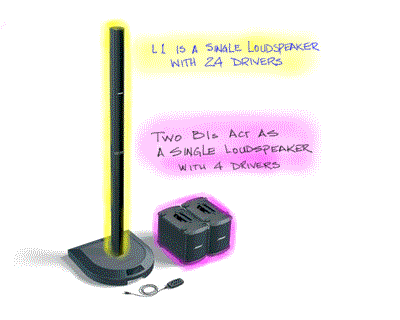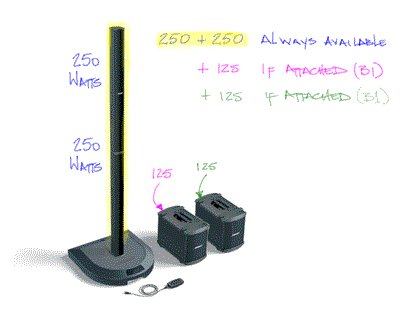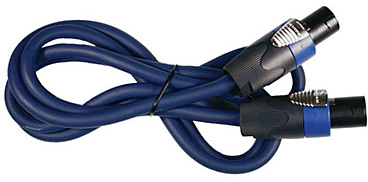Difference between revisions of "L1® System Holistic View"
(first ed) |
m (→Two {{B1}}s as a one bass loudspeaker) |
||
| (15 intermediate revisions by 2 users not shown) | |||
| Line 1: | Line 1: | ||
| − | <big>''' A Holistic View of the L1 | + | <big>''' A Holistic View of the {{L1 nl}} '''</big><ref>[http://bose.infopop.cc/groupee/forums/a/tpc/f/867107664/m/5551058832/r/5551058832 Originally appeared in the {{forum}}]</ref> |
| + | {{Classic icon}} | ||
| + | |||
| + | == The {{L1}} System (Physical) == | ||
| + | Here is one way you can think about the {{L1}} System. | ||
[[Image:SpeakerPower01.gif]] | [[Image:SpeakerPower01.gif]] | ||
| + | === {{L1 CR}} as one loudspeaker === | ||
| + | Think of the {{L1 CR}} (Yellow highlight) is a single loudspeaker with 24 drivers (2.5 inch)<ref name="HilmarSaid">[http://bose.infopop.cc/eve/forums/a/tpc/f/3976055944/m/8151078751?r=8511074851#8511074851 Quoting Hilmar-at-Bose]</ref> supplied by 500 watts for the {{Classic}} and 250 watts for the {{Model I}}. Note: the {{Model I}} provides the same audible output. It is just more efficient than the {{Classic}}. | ||
| + | === Two {{B1}}s as one bass loudspeaker === | ||
| + | Think of the pair of {{B1}}s (Purple highlight) is a single bass loudspeaker with 4 (6.5 inch)<ref name="HilmarSaid" /> drivers supplied by 250 watts. <ref>two {{B1}} loudspeakers connected draws up to 250 watts at 4 ohms</ref> | ||
| − | + | That's 750 watts in total for the {{Classic}} and 500 watts total for the {{Model I}} | |
| − | The | + | == The {{L1}} System (Amplifiers & Power) == |
| − | + | ''' Note: This information below is applicable to the {{Classic}} and not the {{Model I}}''' | |
| − | |||
[[Image:SpeakerPower02.gif]] | [[Image:SpeakerPower02.gif]] | ||
| + | === {{L1 CR}} === | ||
| + | The {{L1 CR}} This is one loudspeaker that happens to break down into two pieces for travel. | ||
| + | This is driven by two separate amps, but this is not important because under normal circumstances both amps are driven identically. One drives the top half of the {{L1 CR}} and the other drives the bottom half. Because the {{L1 CR}} should always be operated as a single unit, what happens when you break it down isn't relevant. | ||
| + | === {{B1}}s === | ||
| + | If you break the pair of {{B1}}s in half, and use just one of them, it draws 125 watts.<ref>one {{B1}} loudspeaker connected draws up to 125 watts at 8 ohms</ref> | ||
| − | {{B1}}s | + | If you don't use the {{B1}}s at all, the amp that is normally used to drive them is idle. |
| − | |||
| − | |||
| − | |||
| − | |||
| − | |||
| + | == Use the proper cables == | ||
| + | {{B1 Cable Warning}} | ||
| + | === Model I === | ||
| + | {{Model I icon}} | ||
| + | The {{Model I}} handles the B1s the same way, but with a more efficient design provides the same audible output from the {{L1 CR}} with a single 250 watt amp. | ||
| Line 26: | Line 38: | ||
<references/> | <references/> | ||
| − | [[ | + | [[Category:L1® System]] |
Latest revision as of 14:15, 26 March 2017
A Holistic View of the L1® [1]
Contents
The L1 System (Physical)
Here is one way you can think about the L1 System.
L1 Cylindrical Radiator® loudspeaker as one loudspeaker
Think of the L1 Cylindrical Radiator® loudspeaker (Yellow highlight) is a single loudspeaker with 24 drivers (2.5 inch)[2] supplied by 500 watts for the L1 Classic and 250 watts for the L1 Model I. Note: the L1 Model I provides the same audible output. It is just more efficient than the L1 Classic.
Two B1 Bass Modules as one bass loudspeaker
Think of the pair of B1 Bass Modules (Purple highlight) is a single bass loudspeaker with 4 (6.5 inch)[2] drivers supplied by 250 watts. [3]
That's 750 watts in total for the L1 Classic and 500 watts total for the L1 Model I
The L1 System (Amplifiers & Power)
Note: This information below is applicable to the L1 Classic and not the L1 Model I
L1 Cylindrical Radiator® loudspeaker
The L1 Cylindrical Radiator® loudspeaker This is one loudspeaker that happens to break down into two pieces for travel. This is driven by two separate amps, but this is not important because under normal circumstances both amps are driven identically. One drives the top half of the L1 Cylindrical Radiator® loudspeaker and the other drives the bottom half. Because the L1 Cylindrical Radiator® loudspeaker should always be operated as a single unit, what happens when you break it down isn't relevant.
B1 Bass Modules
If you break the pair of B1 Bass Modules in half, and use just one of them, it draws 125 watts.[4]
If you don't use the B1 Bass Modules at all, the amp that is normally used to drive them is idle.
Use the proper cables
Warning - Use Blue B1 Cables NL4 cables with your L1 Classic / L1 Model I / L1 Model 1S L1 Model II
If you are using a B1 Bass Module with your Power Stand it is ESSENTIAL for proper operation that you use the BLUE cable supplied with the B1 Bass Module or B2 Bass Module. This is required so that the L1 Classic/L1 Model I/L1 Model 1S/L1 Model II Power Stand can correctly identify when there are bass modules connected to it and if so, how many.
Please click the picture above for ordering information.
- Note
- The B2 Bass Level Switch will not change the sound of the B2 Bass Module if you are not using the correct cable.
See: PS1 Power Stand / Bass Line Out for details about how the Power Stand adapts to the number of bass modules are connected to it.
You may also use high quality NL4 cables (four conductor cables).
Alternate and longer cables for B1s
Model I
The L1 Model I handles the B1s the same way, but with a more efficient design provides the same audible output from the L1 Cylindrical Radiator® loudspeaker with a single 250 watt amp.
- ↑ Originally appeared in the Bose® Pro Portable PA Community
- ↑ 2.0 2.1 Quoting Hilmar-at-Bose
- ↑ two B1 Bass Module loudspeakers connected draws up to 250 watts at 4 ohms
- ↑ one B1 Bass Module loudspeaker connected draws up to 125 watts at 8 ohms







